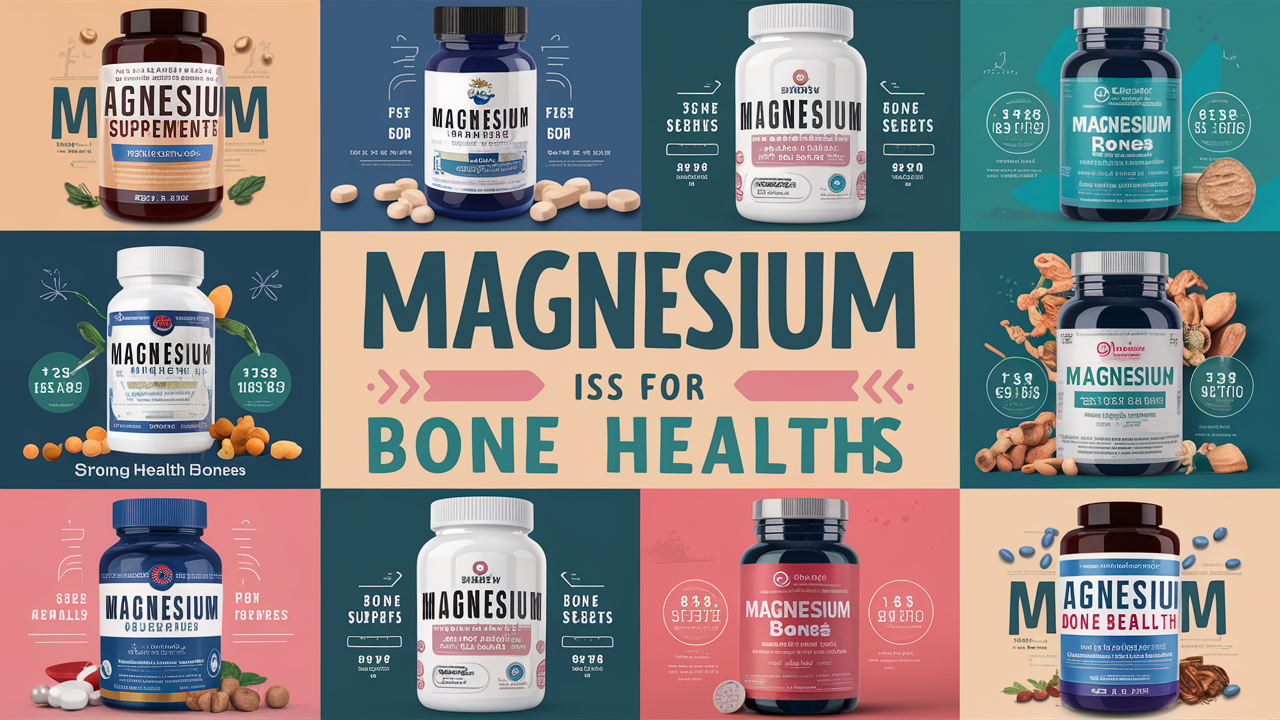Discover how magnesium plays a vital role in boosting bone health for seniors. This comprehensive guide covers the benefits, dietary sources, and supplementation tips to strengthen bones and prevent osteoporosis, ensuring a healthier, more active lifestyle in your golden years.
Maintaining bone health is critical as we age, and seniors face unique challenges in preserving their bone density and strength. While calcium and vitamin D are often highlighted in discussions about bone health, magnesium plays an equally vital role. Magnesium is essential for many bodily functions, including bone formation and maintenance. This blog post will explore the importance of magnesium for seniors, its role in bone health, recommended daily intake, and ways to ensure adequate magnesium levels through diet and supplements.
Understanding Magnesium and Its Functions
Magnesium is a mineral found in the earth, sea, plants, animals, and humans. It is involved in over 300 enzymatic reactions in the body, playing a crucial role in muscle and nerve function, blood glucose control, and protein synthesis. For seniors, magnesium’s role extends to maintaining healthy bones. About 60% of the body’s magnesium is stored in the bones, contributing to bone density and strength.
Magnesium helps convert vitamin D into its active form, which is essential for calcium absorption. Without adequate magnesium, vitamin D cannot effectively aid in calcium absorption, leading to weaker bones. Furthermore, magnesium is involved in the regulation of parathyroid hormone (PTH), which controls calcium levels in the blood. A balance between calcium and magnesium is necessary for proper bone formation and maintenance.
In addition to bone health, magnesium is vital for other bodily functions that indirectly support overall well-being. It aids in energy production by activating adenosine triphosphate (ATP), the body’s main energy source. Magnesium also plays a role in synthesizing DNA and RNA, the body’s genetic material. Moreover, it helps regulate blood pressure, maintains normal heart rhythm, and supports a healthy immune system.
For seniors, maintaining adequate magnesium levels can help alleviate common age-related issues such as muscle cramps, fatigue, and hypertension. By understanding magnesium’s comprehensive role in the body, we can better appreciate its importance for bone health and overall vitality.
Magnesium Deficiency and Its Impact on Bone Health
Magnesium deficiency is relatively common among seniors due to factors such as decreased dietary intake, reduced intestinal absorption, and increased renal excretion. A deficiency in magnesium can have severe consequences for bone health. Studies have shown that low magnesium levels are associated with increased bone loss and a higher risk of fractures.
When magnesium levels are insufficient, calcium metabolism is disrupted, leading to lower bone density. This condition, known as osteoporosis, makes bones brittle and more susceptible to fractures. Seniors with osteoporosis often suffer from hip, spine, and wrist fractures, which can significantly impact their quality of life and independence. Ensuring adequate magnesium intake can help prevent these issues and promote healthier bones.

Magnesium deficiency can also contribute to secondary hyperparathyroidism, a condition where the parathyroid glands secrete excessive amounts of PTH. This overproduction of PTH can lead to increased bone resorption, further weakening bones and increasing the risk of fractures. Additionally, magnesium deficiency can impair the activity of osteoblasts, the cells responsible for bone formation, and enhance the activity of osteoclasts, the cells involved in bone resorption. This imbalance between bone formation and resorption can accelerate bone loss and compromise bone integrity.
Furthermore, magnesium deficiency is associated with chronic inflammation, which can negatively affect bone health. Inflammatory cytokines can promote bone resorption and inhibit bone formation, exacerbating the effects of magnesium deficiency on bone density. Chronic inflammation is also linked to other age-related conditions such as cardiovascular disease, diabetes, and neurodegenerative disorders, highlighting the broader implications of maintaining adequate magnesium levels.
Recommended Daily Intake of Magnesium for Seniors
The recommended daily intake of magnesium varies by age and gender. For senior men aged 51 and older, the recommended intake is 420 milligrams per day. For senior women in the same age group, the recommended intake is 320 milligrams per day. However, these recommendations can vary based on individual health conditions and dietary habits.
Seniors should aim to meet these recommendations through a combination of dietary sources and supplements if necessary. It’s essential to consult with a healthcare provider before starting any new supplement regimen, as excessive magnesium intake can lead to adverse effects such as diarrhea and abdominal cramping.
To determine the appropriate magnesium intake, healthcare providers may consider factors such as kidney function, as impaired renal function can affect magnesium excretion. Additionally, certain medications such as diuretics, proton pump inhibitors, and antibiotics can influence magnesium levels and may necessitate adjustments in dietary intake or supplementation.
Healthcare providers may also recommend periodic monitoring of serum magnesium levels, especially for seniors with chronic conditions that affect magnesium metabolism, such as diabetes, gastrointestinal disorders, and cardiovascular diseases. Regular monitoring can help identify deficiencies early and allow for timely intervention to maintain optimal magnesium levels.
Check out for the comprehensive guide on The Essential Benefits of magnesium for the elderly
Dietary Sources of Magnesium
To ensure adequate magnesium intake, seniors should incorporate a variety of magnesium-rich foods into their diet. Some excellent dietary sources of magnesium include:
- Leafy Green Vegetables: Spinach, kale, and Swiss chard are rich in magnesium and other essential nutrients.
- Nuts and Seeds: Almonds, cashews, pumpkin seeds, and sunflower seeds are high in magnesium and make for healthy snacks.
- Whole Grains: Brown rice, quinoa, and whole wheat products provide a good amount of magnesium.
- Legumes: Black beans, chickpeas, and lentils are not only high in magnesium but also offer additional fiber and protein.
- Fish: Fatty fish like salmon and mackerel are good sources of magnesium and omega-3 fatty acids.
- Fruits: Avocados, bananas, and dried fruits such as figs and prunes contain significant amounts of magnesium.
- Dairy Products: Yogurt and milk can contribute to daily magnesium intake.
Incorporating these foods into a balanced diet can help seniors maintain adequate magnesium levels and support bone health. It is also important to consider cooking methods, as boiling and blanching can reduce the magnesium content of certain foods. Opting for steaming or sautéing can help preserve magnesium levels.
For seniors with dietary restrictions or preferences, there are various ways to incorporate magnesium-rich foods creatively. For example, adding nuts and seeds to salads, smoothies, or yogurt can boost magnesium intake without significantly altering the diet. Whole grains can be used in place of refined grains in recipes, and legumes can be included in soups, stews, and casseroles.
The Role of Magnesium Supplements
While dietary sources of magnesium are preferable, supplements can be beneficial for seniors who struggle to meet their magnesium needs through diet alone. Various forms of magnesium supplements are available, including magnesium oxide, magnesium citrate, and magnesium glycinate. Each type has different absorption rates and potential side effects.

Magnesium citrate is highly absorbable and often recommended for individuals with low magnesium levels. Magnesium glycinate is also well-absorbed and tends to have fewer gastrointestinal side effects, making it suitable for seniors. Magnesium oxide, while commonly available, is less absorbable and may cause digestive issues.
When choosing a magnesium supplement, it’s essential to consider factors such as dosage, form, and individual tolerance. Consulting with a healthcare provider can help determine the most appropriate supplement type and dosage based on individual needs and health conditions.
In addition to choosing the right type of supplement, it’s important to follow dosing recommendations to avoid adverse effects. Magnesium supplements can interact with certain medications, so it’s crucial to discuss supplementation with a healthcare provider, especially if taking medications for conditions such as hypertension, osteoporosis, or gastrointestinal disorders.
Seniors should also be aware of the signs of excessive magnesium intake, such as diarrhea, nausea, and abdominal cramping. In severe cases, hypermagnesemia can occur, leading to symptoms such as low blood pressure, irregular heartbeat, and respiratory distress. Monitoring magnesium levels through regular blood tests can help ensure that supplementation remains safe and effective.
Benefits of Adequate Magnesium Intake for Bone Health
Maintaining adequate magnesium levels offers numerous benefits for bone health in seniors. These benefits include:
- Enhanced Bone Density: Adequate magnesium intake helps maintain bone density and reduces the risk of osteoporosis and fractures.
- Improved Calcium Absorption: Magnesium aids in the conversion of vitamin D into its active form, enhancing calcium absorption and bone health.
- Balanced Parathyroid Hormone Levels: Magnesium regulates PTH, which controls calcium levels in the blood and bone metabolism.
- Reduced Inflammation: Magnesium has anti-inflammatory properties that can help reduce chronic inflammation associated with bone diseases.
- Better Muscle Function: Magnesium is essential for muscle function, which is crucial for maintaining balance and preventing falls in seniors.
Beyond bone health, adequate magnesium intake supports overall well-being. Magnesium’s role in energy production can help combat fatigue and enhance physical performance, allowing seniors to maintain an active lifestyle. Improved muscle function and coordination can also reduce the risk of falls, a common concern among seniors.
Magnesium’s anti-inflammatory properties extend beyond bone health, potentially reducing the risk of chronic conditions such as cardiovascular disease, diabetes, and neurodegenerative disorders. By maintaining adequate magnesium levels, seniors can support their overall health and quality of life.
Potential Risks of Excessive Magnesium Intake
While maintaining adequate magnesium levels is essential, excessive intake can lead to adverse effects. Symptoms of excessive magnesium intake include diarrhea, abdominal cramping, and nausea. In severe cases, hypermagnesemia (high magnesium levels in the blood) can occur, leading to more serious health issues such as irregular heartbeat, low blood pressure, and respiratory distress.
To avoid these risks, seniors should adhere to the recommended daily intake of magnesium and consult with a healthcare provider before starting any new supplement regimen. Monitoring magnesium levels through regular blood tests can help ensure they remain within a healthy range.
It’s also important to consider the potential interactions between magnesium supplements and medications. For example, magnesium can interact with certain antibiotics, reducing their effectiveness. It can also interfere with medications used to treat
Start Your Bone Health Journey Today!
People Also Ask (PAA)
1. How does magnesium contribute to bone health in seniors?
Magnesium plays a crucial role in bone health by aiding in the conversion of vitamin D into its active form, which enhances calcium absorption. It also helps regulate parathyroid hormone levels, essential for maintaining calcium balance and promoting healthy bone formation. Adequate magnesium intake supports bone density, reduces the risk of osteoporosis, and helps prevent fractures.
2. What are the best dietary sources of magnesium for seniors?
Some of the best dietary sources of magnesium include leafy green vegetables (such as spinach and kale), nuts and seeds (like almonds and pumpkin seeds), whole grains (such as brown rice and quinoa), legumes (like black beans and chickpeas), fatty fish (such as salmon and mackerel), fruits (like avocados and bananas), and dairy products (such as yogurt and milk).
3. How much magnesium should seniors consume daily for optimal bone health?
The recommended daily intake of magnesium for senior men aged 51 and older is 420 milligrams per day, while senior women in the same age group should aim for 320 milligrams per day. These recommendations may vary based on individual health conditions and dietary habits, so it’s essential to consult with a healthcare provider.
4. Can magnesium supplements help improve bone health in seniors?
Yes, magnesium supplements can help improve bone health in seniors, especially those who struggle to meet their magnesium needs through diet alone. Supplements such as magnesium citrate and magnesium glycinate are well-absorbed and can help maintain adequate magnesium levels. However, it’s important to consult with a healthcare provider before starting any new supplement regimen.
5. What are the signs of magnesium deficiency in seniors?
Signs of magnesium deficiency in seniors can include muscle cramps, fatigue, weakness, loss of appetite, nausea, and abnormal heart rhythms. Chronic deficiency can lead to more severe issues such as osteoporosis and increased risk of fractures. Regular monitoring and adequate dietary intake can help prevent magnesium deficiency.

Conclusion
Maintaining adequate magnesium levels is essential for bone health and overall well-being in seniors. Magnesium plays a vital role in bone density, calcium absorption, and muscle function, all of which are crucial for preventing osteoporosis and fractures. While dietary sources are the best way to meet magnesium needs, supplements can be beneficial for those who have difficulty achieving adequate intake through diet alone.
Incorporating magnesium-rich foods such as leafy greens, nuts, seeds, whole grains, legumes, and fatty fish into a balanced diet can help seniors maintain healthy magnesium levels. Additionally, consulting with a healthcare provider before starting any new supplement regimen is important to ensure safety and effectiveness.
By prioritizing magnesium intake, seniors can support their bone health, reduce the risk of fractures, and enhance their overall quality of life. Remember, a balanced approach to nutrition and regular monitoring of magnesium levels are key to maintaining optimal health in the golden years.
Health Disclaimer
The information provided in this blog is for informational purposes only and should not be considered medical advice. Always consult with a healthcare professional before making any health-related decisions. This article does not replace professional medical guidance, diagnosis, or treatment.








